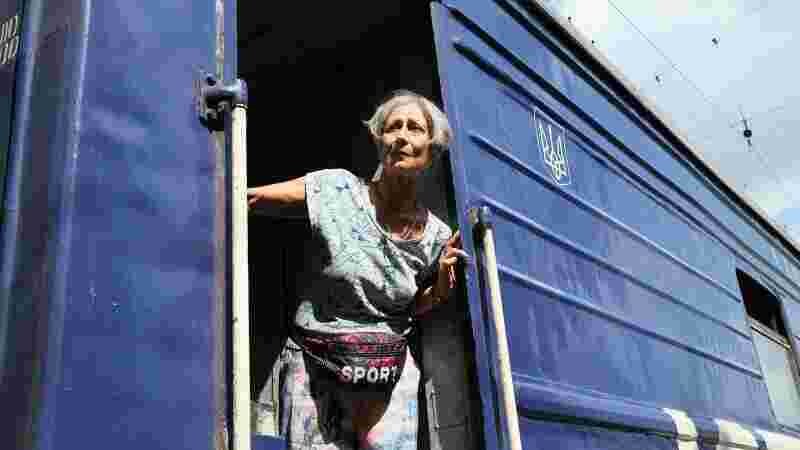Halyna meticulously sorts through her medical kit, discarding unnecessary packaging as empty boxes gather at her feet. Every cubic centimeter matters. She’s leaving her home, embarking on a perilous journey with an uncertain end. At 59, she never imagined fleeing would become her reality.
Halyna and her husband Olexey, 61, are from Selydove, a town near Pokrovsk, a city now teetering on the edge of becoming the next major battleground in eastern Ukraine. They clung to hope for a miracle, staying even after their friends fled, their beloved Selydove now too dangerous to visit. But the relentless assault on their town became unbearable.
“The bombing surrounded us, night and day. Our house still stands, but for how long? Everything else lies in ruins,” Halyna confided, her voice heavy with grief. "Our soldiers helped us escape," she added, her words underscoring the urgency of their situation.
Their story is not unique. Thousands are fleeing Pokrovsk and its surrounding areas as Russian forces advance relentlessly, their objective clear: the capture of the strategically vital city.
Pokrovsk represents a linchpin in Ukrainian defenses, a critical supply route connecting military hubs in the Donetsk region. Its fall would be a significant blow to Ukraine's hold on the area.
The tension in Pokrovsk is palpable. The city center echoes with the terrifying thuds of explosions from the outskirts, punctuated by the sharp retort of Ukrainian counterstrikes targeting Russian positions. The invisible hand of fear tightens its grip on the city's remaining residents.
Serhiy Dobryak, the head of Pokrovsk’s military-civilian administration, races against time. He urges residents to flee, knowing that each passing hour brings them closer to unimaginable danger.
“Most leave willingly, some need persuasion. This week, we initiated mandatory evacuations for families with children,” he stated, revealing the escalating crisis. Yet, even with the looming threat, leaving is a gamble many can't afford to take.
Arina, 31, a dentist with a young son, finds herself caught in this desperate predicament. She and her husband struggle to find housing, encountering discrimination against families with young children.
“Landlords treat kids, especially toddlers, like animals. They only accept older children or offer dilapidated apartments at exorbitant prices,” Arina lamented, her voice tinged with frustration and despair.
Her son, David, almost three years old, has known nothing but the harsh realities of war. His innocence, a stark contrast to the grim world around him, is a poignant reminder of the human cost of this conflict.
Arina takes him to an empty playground, creating a semblance of normalcy. David, oblivious to the weight of their situation, delights in having the playground all to himself.
“He only recently started reacting to the explosions. I tell him they’re fireworks. I can’t bring myself to tell him the truth,” Arina confessed, her eyes welling up.
For many like Arina, the war didn't begin in 2022. They carry the scars of the 2014 conflict, when Russia annexed Crimea and fueled separatist movements in Donetsk and Luhansk. They are refugees twice over, haunted by the cyclical nature of displacement.
Pavlo Dyachenko, a Donetsk region police officer, spearheads evacuation efforts, his days spent navigating a web of logistical challenges and human resistance.
“Many don’t grasp the gravity of the situation. They see Pokrovsk relatively unscathed compared to other ravaged cities,” Dyachenko explained, highlighting the dangerous illusion of safety.
He recounts harrowing stories of evacuations under fire, pleading with people to leave before it’s too late.
While escape from Pokrovsk remains relatively accessible, the situation deteriorates rapidly just a few miles away. There, police scramble to extract those who stayed too long, their armored vehicles navigating roads under constant bombardment.
Despite the imminent danger, a stubborn few refuse to abandon their homes. Some lack options; others feel unwelcome elsewhere in Ukraine, their loyalty questioned due to their cultural and linguistic ties to Russia.
Oksana, a shopkeeper, embodies this sentiment. She tends to her elderly mother, cares for stray animals, and runs her business, her roots deeply embedded in Pokrovsk's soil.
“Where can we go?” she asks, her voice heavy with resignation. “No one wants to rent to people with animals, and we have no family elsewhere."
As the evacuation train departs Pokrovsk, tears flow freely, goodbyes heavy with uncertainty. Oksana, 37, bids farewell to her husband, Oleh, his decision to stay behind fueled by economic necessity. He is a miner, his livelihood intertwined with the fate of his city.
Halyna and Olexey, their journey to Italy just beginning, find themselves overwhelmed by the unfamiliar landscape of Dnipro. The sprawling city stands in stark contrast to their small-town life, amplifying their sense of displacement.
Though grateful for the chance to reunite with their daughter and granddaughter, their hearts remain tethered to their Ukrainian home.
“I long to return to the country of my birth, to my home, to Ukraine,” Halyna declared, her voice unwavering in its resolve.
Their story, like those of countless others fleeing Pokrovsk, underscores the heartbreaking reality of this conflict. Lives fractured, futures uncertain, they carry the weight of displacement, their hopes pinned on the dream of one day returning home.
Russian forces close in on key Ukrainian city of Pokrovsk. But fleeing is hard – even for those who can afford it
The empty boxes are piling up on the floor as Halyna goes through her medical kit, taking out packs of pills and discarding any unnecessary packaging. She can’t afford to waste space. She’s running away and the journey ahead is long and risky.




